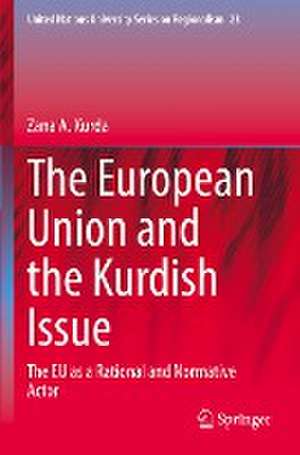The European Union and the Kurdish Issue: The EU as a Rational and Normative Actor: United Nations University Series on Regionalism, cartea 23
Autor Zana A. Kurdaen Limba Engleză Paperback – 13 aug 2023
| Toate formatele și edițiile | Preț | Express |
|---|---|---|
| Paperback (1) | 691.91 lei 6-8 săpt. | |
| Springer International Publishing – 13 aug 2023 | 691.91 lei 6-8 săpt. | |
| Hardback (1) | 698.15 lei 6-8 săpt. | |
| Springer International Publishing – 12 aug 2022 | 698.15 lei 6-8 săpt. |
Din seria United Nations University Series on Regionalism
- 15%
 Preț: 647.27 lei
Preț: 647.27 lei - 24%
 Preț: 790.73 lei
Preț: 790.73 lei - 18%
 Preț: 738.20 lei
Preț: 738.20 lei - 15%
 Preț: 645.47 lei
Preț: 645.47 lei -
 Preț: 393.35 lei
Preț: 393.35 lei -
 Preț: 395.09 lei
Preț: 395.09 lei - 15%
 Preț: 647.08 lei
Preț: 647.08 lei - 15%
 Preț: 651.67 lei
Preț: 651.67 lei - 18%
 Preț: 893.05 lei
Preț: 893.05 lei - 15%
 Preț: 641.20 lei
Preț: 641.20 lei -
 Preț: 442.46 lei
Preț: 442.46 lei - 18%
 Preț: 721.81 lei
Preț: 721.81 lei -
 Preț: 425.42 lei
Preț: 425.42 lei - 15%
 Preț: 646.11 lei
Preț: 646.11 lei - 18%
 Preț: 783.68 lei
Preț: 783.68 lei - 15%
 Preț: 690.94 lei
Preț: 690.94 lei - 18%
 Preț: 727.80 lei
Preț: 727.80 lei - 18%
 Preț: 797.24 lei
Preț: 797.24 lei - 20%
 Preț: 560.31 lei
Preț: 560.31 lei -
 Preț: 433.68 lei
Preț: 433.68 lei - 15%
 Preț: 636.12 lei
Preț: 636.12 lei - 18%
 Preț: 940.09 lei
Preț: 940.09 lei - 20%
 Preț: 577.19 lei
Preț: 577.19 lei - 15%
 Preț: 642.51 lei
Preț: 642.51 lei -
 Preț: 394.12 lei
Preț: 394.12 lei -
 Preț: 391.61 lei
Preț: 391.61 lei
Preț: 691.91 lei
Preț vechi: 814.01 lei
-15% Nou
Puncte Express: 1038
Preț estimativ în valută:
132.41€ • 137.73$ • 109.32£
132.41€ • 137.73$ • 109.32£
Carte tipărită la comandă
Livrare economică 14-28 aprilie
Preluare comenzi: 021 569.72.76
Specificații
ISBN-13: 9783031051883
ISBN-10: 3031051882
Ilustrații: XVII, 175 p. 15 illus. in color.
Dimensiuni: 155 x 235 mm
Greutate: 0.28 kg
Ediția:1st ed. 2022
Editura: Springer International Publishing
Colecția Springer
Seria United Nations University Series on Regionalism
Locul publicării:Cham, Switzerland
ISBN-10: 3031051882
Ilustrații: XVII, 175 p. 15 illus. in color.
Dimensiuni: 155 x 235 mm
Greutate: 0.28 kg
Ediția:1st ed. 2022
Editura: Springer International Publishing
Colecția Springer
Seria United Nations University Series on Regionalism
Locul publicării:Cham, Switzerland
Cuprins
- 1. Introduction. - 2. Studying the European Union’s Actorness in the Kurdish Issue: An Analytical Model. - 3. The Kurdish Issue: A Transnational Political Conflict. - 4. The European Union and the Kurds in Turkey. - 5. The European Union and the Kurds in Iraq. - 6. The European Union and the Kurds in Syria. - 7. The European Union and the Kurds in Iran. - 8. Conclusions.
Notă biografică
Zana A. Kurda is Director of European Union Affairs at the Kurdistan Regional Government’s Mission to the European Union in Brussels. He has held this position since 2012. He has a BSc in Commercial Economics (Saxion University in the Netherlands in 2006), an MSc in European Studies (University of Twente – the Netherlands in 2008), and a PhD in Political Science (Free University of Brussels in 2021).
Textul de pe ultima copertă
This book focuses on the European Union as an actor involved in the transnational Kurdish issue covering Turkey, Iran, Iraq and Syria. It demonstrates that, instead of being simply a humanitarian actor in the issue, the EU has considered its bilateral interests with the four states in question as well as its extent of acceptance in approaching the Kurdish issue. It has combined its traditional humanitarian/normative consideration with its geopolitical interests in relation to strategies related to the four states. This book provides a unique perspective on the EU as an actor in the Kurdish issue and from a wider perspective, it provides interesting insights into the EU’s interactions with geopolitics, which has become the topic of a lively scholarly debate in recent years. The book is a resource for researchers and students studying the European Union as a global actor, and for governmental or non-governmental professionals dealing directly with, or having interest in, the EU and/or Kurdish affairs.
Caracteristici
Provides unique and comprehensive insights into the relations of two relatively new and dynamic IR actors Succeeds in drawing the geopolitical complexity of the Kurdish issue and the risks involved for external actors Analyses the European Union's role in the greater Kurdish issue across four countries
